正在加载图片...

Lesson 6 Monoclonal Antibody Technology Substances foreign to the body,such as disease-causing bacteria,viruses and other infectious agents known as antigens,are recognized by the body's immune system as invaders.Our natural defenses against these infectious agents are antibodies,proteins that seek out the antigens and help destroy them. Antibodies have two very useful characteristics.First,they are extremely specific:that is,each antibody binds to and attacks one particular antigen.Second,some antibodies,once activated by the occurrence of a disease,continue to confer resistance against that disease:classic examples are the antibodies to the childhood diseases chickenpox and measles The second characteristic of antibodies makes it possible to develop vaccines.A vaccine is a preparation of killed or weakened bacteriaor viruses that,when introduced into the body,stimulates the production of antibodies against the antigens it contains. It is the first trait of antibodies,their specificity.that makes monoclonal antibody technology so valuable.Not only can antibodies be used therapeutically,to protect against disease they can also help to diagnoa wide variety of iless and can detect the presence of drugs,viral and bacterial products, and other unusual or abnormal substances in the blood. Given such a diversity of uses for these disease-fighting substances,their production in pure quantities has long been the focus of scientific investigation.The conventional method was to inject a laboratory animal with an antigen and then,after antibodies had been formed,collect those antibodies from the blood rum(antibody-containing bood serum is called antiserum).There are two problems with this method:It yields that contains undesired substances,and it provides a very small amount of usable antibody. Monoclonal antibody technology allows us to produce large amounts of pure antibodies in the following way:We can obtain cells that produce antibodies naturally:we also have available a class of cells that can grow continally in cell culture If we form a hybrid that combines the characteristic of "immortalitywith the ability to produce the desired substance,we would have,in effect,a factory to produce antibodies that worked around the clock. 1111 Lesson 6 Monoclonal Antibody Technology Substances foreign to the body, such as disease-causing bacteria, viruses and other infectious agents, known as antigens, are recognized by the body's immune system as invaders. Our natural defenses against these infectious agents are antibodies, proteins that seek out the antigens and help destroy them. Antibodies have two very useful characteristics. First, they are extremely specific; that is, each antibody binds to and attacks one particular antigen. Second, some antibodies, once activated by the occurrence of a disease, continue to confer resistance against that disease; classic examples are the antibodies to the childhood diseases chickenpox and measles. The second characteristic of antibodies makes it possible to develop vaccines. A vaccine is a preparation of killed or weakened bacteria or viruses that, when introduced into the body, stimulates the production of antibodies against the antigens it contains. It is the first trait of antibodies, their specificity, that makes monoclonal antibody technology so valuable. Not only can antibodies be used therapeutically, to protect against disease; they can also help to diagnose a wide variety of illnesses, and can detect the presence of drugs, viral and bacterial products, and other unusual or abnormal substances in the blood. Given such a diversity of uses for these disease-fighting substances, their production in pure quantities has long been the focus of scientific investigation. The conventional method was to inject a laboratory animal with an antigen and then, after antibodies had been formed, collect those antibodies from the blood serum (antibody-containing blood serum is called antiserum). There are two problems with this method: It yields antiserum that contains undesired substances, and it provides a very small amount of usable antibody. Monoclonal antibody technology allows us to produce large amounts of pure antibodies in the following way: We can obtain cells that produce antibodies naturally; we also have available a class of cells that can grow continually in cell culture. If we form a hybrid that combines the characteristic of "immortality" with the ability to produce the desired substance, we would have, in effect, a factory to produce antibodies that worked around the clock